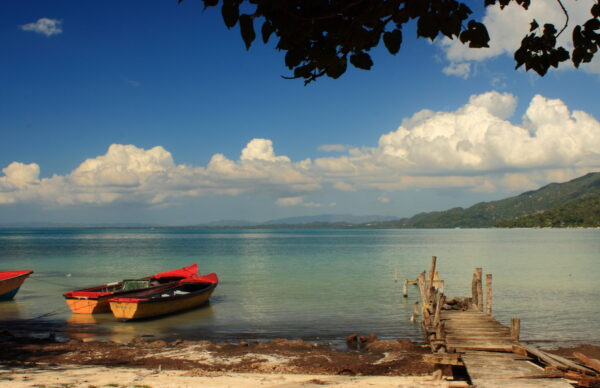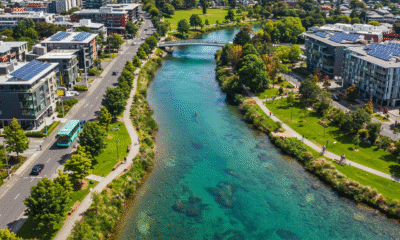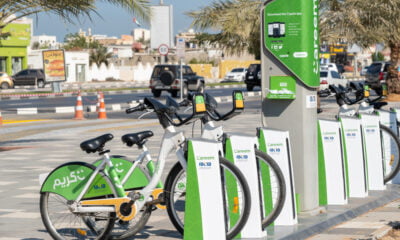

Features
Sustainable tourism: the only option
The Travel Foundation was set up by the industry for the industry. “The reason we exist is to help the industry understand and reduce the impacts of tourism on the destinations that it so depends upon”, says Sue Hurdle, chief executive of The Travel Foundation, in an interview with Blue & Green Tomorrow.
This piece originally featured in B>’s Guide to Sustainable Tourism 2012.
Sue Hurdle began her career in a way that is familiar to many in the travel industry. “I started off working overseas in holiday resorts and decided it would be great to have a career in an industry that helps people to have a good time”. But it was while working for large tour operator in 1993 that she read a piece in the trade press that gave her cause to stop and think.
“The article talked about a new resort development in Goa. According to the article the local community was having its water supplies reduced at certain times of the day so that the new resort could provide enough water for swimming pools, golf courses and so on, which seemed a rather strange affair to me. I felt I needed to learn more and managed to persuade Thomas Cook to pay for me to take a Masters degree in Tourism and Social Responsibility.” The course was one of the first of its kind in those days, but Hurdle is pleased to say that there are many more courses available today.
“Having spent a year learning about the issues, I had the bit between my teeth and decided that really needed to dedicate the next few years of my career trying to help the mainstream tourism industry understand what it could do to make tourism better for destinations, From the perspective of both the environmentand the people who live there.”
Hurdle ended up working for a small charity called ‘Action For Conservation Through Tourism’, setting up a discussion forum with the mainstream industry. Initially, the likes of British Airways and Airtours sat around the table soon to be joined by other big household names, such as First Choice, in addition to the trade association ABTA. “The aim was really to help the industry think about the issues surrounding sustainability and how it applies to mainstream tourism”. In 2001, the Government got interested in preparation for Rio+10, but has lost momentum since then, which is a source of disappointment for Hurdle
“Ten years ago, it was great to have the UK Government really driving [sustainable tourism], engaging lots of different organisations, NGOs and industry, but 10 years on, for Rio+20 the UK Government is not looking at tourism. So that incentive is no longer there”.
Returning to the back story, the Government’s interest in the discussion forum led to funding, which was matched by the industry, that was used to set-up what today is called The Travel Foundation, now nine years old.
When asked how the industry has changed in that time, Hurdle has some positive news. “When we started, very few mainstream companies had even begun to think about sustainable tourism, let alone have a policy. Ten years down the line, the major tour operators in the UK have all begun to think about it; they all have policies and the majority employ someone who has specific responsibility for figuring out how their business can be more sustainable.
“The great risk is, if the industry doesn’t do anything to protect the people and the environment in destinations, they won’t have a business in the future. We all want to go and lie on a nice clean beach and we want to feel welcomed by the people , eat nice food, enjoy the local ambience and take home positive memories of our visit. And if businesses don’t look after these things, in the end they don’t really have a product to sell.”
Discussing semantics of sustainable, responsible, ethical or eco tourism, Hurdle hits the nail on the head with something less complicated: “It’s really about tourism that is simply better. Better for destinations, better for people, better for the environment”.
Following on from the need to balance the needs of the planet, its people and prosperity and the fact that everyone becomes a winner with sustainable tourism, the concept of all-encompassing sustainability sprang forth.
“What we often say to companies is that things need to be sustainable at every level. It’s a competitive market and we are aware that, at the moment, people are particularly price conscious. But actually, when you start looking at sustainability, it’s not about cost; it’s as much about quality of experience. ”
“When you mention sustainable tourism, people are sometimes confused and start thinking about particular types of holiday. But what we are saying is that sustainable tourism can and should be any kind of tourism. All tourism has an impact, which can be good or bad.
“The challenge is to make the sustainable option the only option—the norm.”
And it needn’t necessarily be about staying in an eco-lodge and travelling there by bicycle. “Sustainable tourism can be about staying in a very mainstream destination in a very mainstream hotel. If that hotel is reducing the amount of water and energy it uses on your behalf, and if it’s sourcing its produce from local farmers, and if it’s making sure that the excursions it offers are benefitting the local community, then it is on its way to being a sustainable product.”
It is a very broad definition of sustainable tourism that doesn’t match the traditional one that often comes to mind, but it’s hugely compelling; it leaves no room for excuses—including concerns about cost—from anyone in the travel industry.
Indeed, the initial driver for a lot of businesses to become interested in sustainability is profit. “It’s also about reducing operational costs. If you can reduce the electricity and water use in your hotels, you can reduce the costs of hosting guests for the night, which can directly affect the bottom line”.
“It can also help differentiate a company from its competitors—if you can offer consumers a better experience through more sustainable practices, then it becomes a real business benefit. And that is what The Travel Foundation is really focused on.”
In fact, the concept of a broader overarching form of sustainability is widespread over diverse industries. In our previous Guide to Sustainable Investment, the links between taking sustainable policy seriously and increased profit became very apparent.
“If a company starts off on this journey because it perceives there will be cost savings down the line, that’s ok. As long as they are making a start—that’s the important thing”.
Business benefits are great for the industry, but where does the average vacationer realise the advantages of sustainable tourism?
 “The Travel Foundation is industry focused, but we are also attentive to the consumer. ‘Make Holidays Greener’ is a consumer-facing campaign that endeavours to raise awareness of the different choices people can make, which is supported and delivered by the industry.”
“The Travel Foundation is industry focused, but we are also attentive to the consumer. ‘Make Holidays Greener’ is a consumer-facing campaign that endeavours to raise awareness of the different choices people can make, which is supported and delivered by the industry.”
Importantly, the campaign focuses on the positive steps consumers can take to decrease their own impact. It’s about sharing ideas and inspiring people to do things differently. “If you’re going on a ‘bucket & spade’ type holiday in Spain, for example, you might want to think about going out and trying one of the restaurants in the local village rather than reverting to chain restaurants. You might want to purchase souvenirs that are made locally from renewable materials”.
Going off the beaten track, it seems, is one way of creating a more sustainable experience and, most probably, a more enjoyable one.
It’s often the small, simple things you do as a tourist that make all the difference. “Learning a little about the destination beforehand and learning a few words of the language, so that you can say hello to local people, go a long way. And very often they’re the things that will give you a much better holiday”.
“We can also vote with our wallets to a certain extent to help influence and shape the products and services that are being offered in destinations. Ultimately, the tourism market is catering to us”.
The Travel Foundation is very vocal about its commendable objective of making all tourism sustainable, but as this transition is occurring, is there a risk of a confusing message for consumers?
Hurdle believes that through initiatives like ‘Make Holidays Greener’, which The Travel Foundation are running for the whole month of July this year, consumers can be engaged and, because the industry is involved and supportive, everyone can be on the same page. “Quite a number of the major tour operators have published their sustainability plans, which are available on websites and increasingly talked about these days.
“There is quite a lot of research we can do ourselves. And there have been a couple of television programmes that have covered the issue as well. So I think people are beginning to be more informed. And though consumers may not be asking for sustainability—and perhaps we shouldn’t expect people to come in and say ‘I want to book a sustainable holiday’ per se—when you actually look at what a sustainable holiday means, the sustainable elements are the things that make a holiday better”.
“Ask someone if they would like to book a sustainable package holiday and they might say ‘What does that mean?’ or ‘No, I just want a regular, good value holiday for my family’, but if offered the same option with a different spin—‘do you want a holiday where you’ll meet new people, see different things, stay in a beautiful environment that’s well-cared for, and be made to feel very welcome by the people there’—people, of course, react very positively.”
As with all things positive, there is the potential for a balancing negative force—the danger that some companies could overuse perhaps weak sustainability credentials to sell holidays. It’s a process known as ‘greenwashing’ and something that occurs in other industries, but what about tourism? Is the link between sustainability and a great holiday experience sufficient to counter such attempts?
“Claims of greenwash have been leveled at many industries, and I think it is a cross sector thing. Certainly, some of the smaller companies that I’ve spoken to are very fearful of being accused of greenwash and, for that reason, I don’t think we’re seeing many businesses out there that are claiming to be green.
“Rather, companies are describing what they’ve done to make things more sustainable. I think that’s why a number of companies are working with organisations like ours to make those improvements and to share what they’ve learnt”.
And that’s really what it’s all about—moving tourism forward; recognising that there are good and bad impacts of tourism; and asking the important question “how can tourism be improved for all?” After all, a tourism industry without an eye on sustainability is not a viable long-term option.
“I see a lot of passion out there—a few key people are really championing sustainable tourism and acknowledging that it’s about the survival of the industry.”
Action must follow ideas, and where The Travel Foundation really makes it’s mark on sustainable tourism is in the projects it works on with the industry and a diverse range of stakeholders (see sidebar 2).
Whether convincing hotels to purchase produce from local farmers or training local excursion operators to reduce hassle on the beachfront, the real benefit of the project work is the learning experience it provides. The Travel Foundation assesses the successes and failures of each project and uses that knowledge to create tools [LINK] for the industry so that sustainability initiatives can be replicated by all.
“Whatever we do, it’s always with one eye on taking what we’ve learnt and sharing it with the rest of the industry”.
Richard Branson takes current pride of place on The Travel Foundation’s website because of one particular project. “We’ve been working with Virgin Holidays for a number of years. They are one of the companies that have been a key partner in the Caribbean. Richard Branson is talking particularly about a marine protected areas project we’re working on together. His interest in sustainability is fairly well known and he has enabled his companies to pursue relevant interests in it. It’s been really terrific to have that level of support from the top”.
And while the organisations like The Travel Foundation and the industry work together, the consumer also has an important part to play. “Most industries are driven by customer demand, so if people do start asking questions like ‘what are you doing to make sure my holiday is as sustainable as it can be?’, ‘how is my hotel trying to save energy and are they putting unnecessary strain on the local water supply?’, then the industry will take note and change”.
Concluding, Hurdle says, “Holidays are very important to all of us, and we all want to make sure we get the most out of our time away. And thinking about how we can lessen the impact our holiday has on the environment and improve benefits for the people who live in the destination will help us have a better time ourselves”.
For more information on sustainable tourism and The Travel Foundation, please visit its website.
Further reading:


 Environment12 months ago
Environment12 months agoAre Polymer Banknotes: an Eco-Friendly Trend or a Groundswell?

 Features11 months ago
Features11 months agoEco-Friendly Cryptocurrencies: Sustainable Investment Choices

 Features12 months ago
Features12 months agoEco-Friendly Crypto Traders Must Find the Right Exchange

 Energy11 months ago
Energy11 months agoThe Growing Role of Solar Panels in Ireland’s Energy Future




























